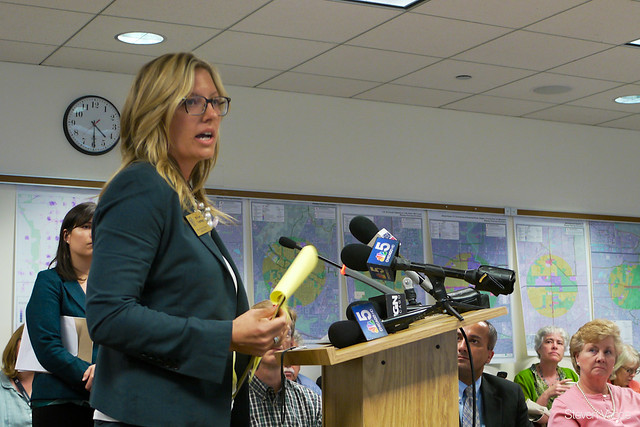
Local advocates are scoffing at the suggestion, made by an Illinois Department of Transportation representative last week, that striking the Illiana Tollway from the Chicago region's long-term regional plan would jeopardize transportation spending across the entire region. Instead, advocates insist that deleting the costly, sprawl-inducing road would cause at most a brief procedural delay in other projects, and ultimately free up millions of dollars for more urgent priorities.
Bruce Carmichael from IDOT made this claim at a CMAP transportation committee meeting last week. He said that, if the CMAP board votes to delete the Illiana from the GO TO 2040 regional plan on October 8, the revised plan would need a fresh review. The entire plan would be temporarily invalidated while that "conformity analysis" and public comment period is underway. While Carmichael is correct on that point, the analysis would cause at most a brief delay that would not necessarily disrupt any projects in progress.
Carmichael said that, while the revised plan is being reviewed, the federal government would stop sending checks that pay for already-approved projects. For example, the Chicago Department of Transportation and the Chicago Transit Authority would be unable to be reimbursed for building new bike lanes and buying new train cars.
Metropolitan Planning Council vice president Peter Skosey confirmed with the committee's Federal Highway Administration representative that the review would not, in fact, interfere with FHWA's payments. The FHWA is scheduled to send its next round of checks just before the joint meeting on October 8, and "those dollars will continue to come to us," Skosey told me.
Randy Neufeld, also a member of the transportation committee, said that the conformity analysis would take all of one day to ensure that the altered GO TO 2040 complies with federal air quality regulations. CMAP would then launch a 30-day public comment period. Skosey said that CMAP could complete the entire review in less than two months, and adopt the final plan in November -- well before the next FHWA payment period.
Kyle Smith of the Center for Neighborhood Technology thinks that public comments would side with a revised, Illiana-free plan, anyways. "The removal of the Illiana," Smith explained to me, "would be justified by the hundreds of public comments against it" that have been received so far. People who wrote into CMAP overwhelmingly opposed the 47-mile tollway, saying it would destroy heritage farmland and shift $250 million in public funds from worthier projects. Earlier, we've also cited how tollways across the country have been built on faulty traffic projections, leading to default – which in this case would leave the fiscally-strapped state on the hook for over $1 billion.
Smith continued, saying that "it should be the nature of a public agency to listen to those comments, and remove the project from the plan." He relayed that another IDOT representative said at the meeting: "[Pete Harmet] suggested public comments don't capture support for or against the expressway, and were not relevant for this decision."
Neufeld said that the October meeting's outcome "all boils down to votes." If the votes are there to remove the Illiana Tollway from GO TO 2040, "then the procedural stuff doesn't matter, and the time constraints really aren't an issue." He clarified that the Illiana Tollway was added to GO TO 2040 a year ago via an amendment, and that an amendment could just as easily take it out. "It's just whether or not there’s majority support for that," Neufeld said.
Neufeld congratulated the "progress on multi-modal efforts at IDOT," citing the first ever statewide bike plan, but adds that "they're also a creature of the governor, and the governor wants Illiana."
CMAP is expecting many people to speak up about the plan update at the joint meeting on October 8. They've dedicated one hour of the 9 a.m. meeting to comments, where they'll hear sixty people speak. They're also taking comments via email and their online form, until this Thursday, October 2, at 5 p.m.



